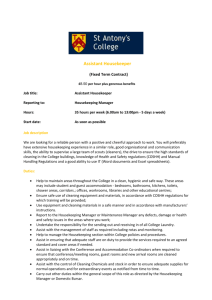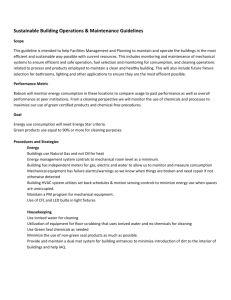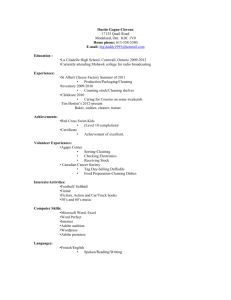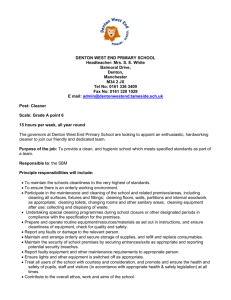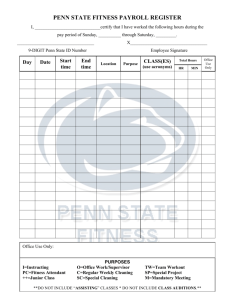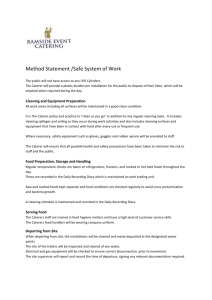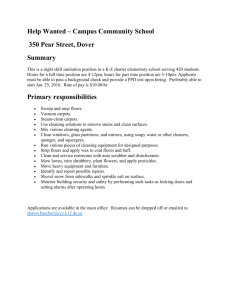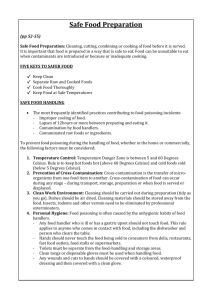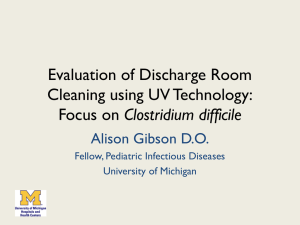From Vision to Reality!!
advertisement
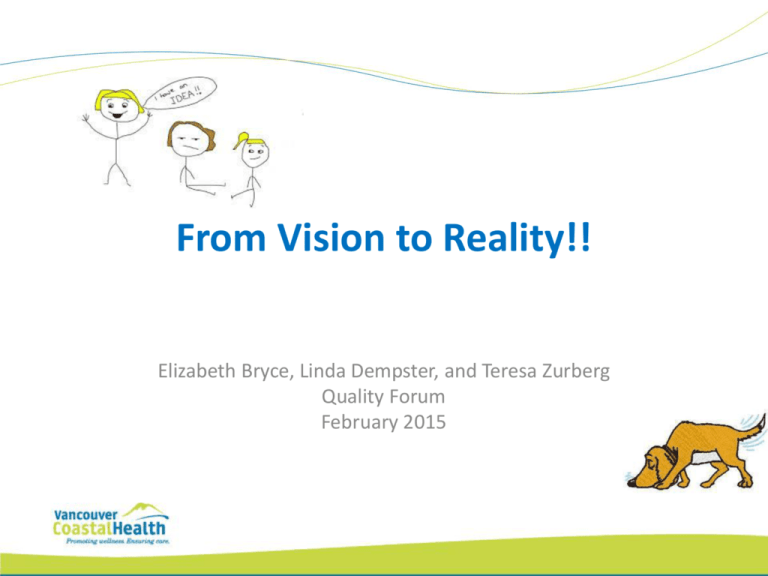
From Vision to Reality!! Elizabeth Bryce, Linda Dempster, and Teresa Zurberg Quality Forum February 2015 Hair-brained idea you say? • Ever think of something way out of the box and don’t know how to bring it to reality? • Here is the recipe… Background • Middle managers have the ability to make significant changes in their organizations • They have their ear to the ground and can see when changes would have a positive impact • BUT: – They have to sell it to the senior levels which may not be easy. Objectives for today 1. Some tips on how to get your ‘way out there’ idea accepted 2. Examples along the way- an innovative approach to reducing C. difficile infections at Vancouver General Hospital 3. Results of the evaluation/research 4. FinallyThe next generation of ‘way out there’ ideas!! Issue Sellers • Issue sellers accomplish their goals; – – – – – Voice ideas and concerns Timing Political sensitivity Interpersonal connections Rhetorical skill “Get the boss to buy-in” HBR, January 2015 John Kotter- new focus on ‘buy-in’ Kotter: “Good ideas don’t stand up on their own, they need support. We have all experienced great ideas – simple and grand – that have got shot down in public, or behind our backs.” 7 key elements 1. 2. 3. 4. Tailor your pitch Frame the issue Manage emotions Get the timing right 5. Involve others 6. Adhere to norms 7. Suggest solutions Source: Susan Ashford, James Detert HBR, January 2015 1. Tailor your pitch • Know your audience Eg. CDI rates high Morbidity/mortality Public pressure Right thing to do! 2. Frame the Issue • How can the issue be connected to the organizational priorities? Eg. CDI rates as a ‘P4P’ Provincial priority 1st in Canada technology- beta site 3. Manage Emotions (on both sides) YOU • Generate a POSITIVE passion • Manage your own level of frustration if things are not happening quickly BOSS • Appeal to current situation – Eg. technology only available now 4. Get the timing right • Timing is crucial Eg. CDI- you have tried all else and continue to see high rates - The issue is gaining momentum in wider circles “Catch the Wave” -consider your timing to bring an idea/concept forward. 5. Involve Others • Tap into others Eg. CDI- work with physicians, leaders, performance improvement experts, housekeeping -information and research from U.S. Lab had been using technology for yearsinclude them as experts 6. Adhere to Norms • Consider the culture of your organization and its norms Eg. CDI - informal discussions about RD • BUT: – In presenting to senior leaders we used a formal approach and did a scientific review – Plus used a rigorous evaluation criteria UV Disinfection Technology; RD • We had already put in place a decluttering program as well as an equipment cleaning program so the next step was to evaluate this new technology Persistence of MRSA/VRE in patient rooms after manual cleaning BEFORE ANY CLEANING AFTER MANUAL CLEANING AFTER UVC DISINFECTION Before manual cleaning (37/61 rooms positive for MRSA or VRE) Before vs after manual cleaning (37/61 vs 32/61 rooms positive for MRSA or VRE , Fisher exact test p=0.4652) Before vs after UVC disinfection (32/61 vs 5/61 rooms positive for MRSA or VRE, Fisher exact test *p<0.0001) Persistence of C. difficile in patient rooms after manual cleaning BEFORE ANY CLEANING AFTER MANUAL CLEANING AFTER UVC DISINFECTION Before manual cleaning (7/21 rooms positive for C. difficile) Before vs after manual cleaning (7/21 vs 5/21 rooms positive for C. difficile , Fisher exact test p=0.7337) Before vs after UVC disinfection (5/21 vs 0/21 rooms positive for C. difficile, Fisher exact test *p=0.0478) Persistence of C. difficile in patient rooms after manual cleaning BEFORE ANY CLEANING AFTER MANUAL CLEANING AFTER UVC DISINFECTION Before manual cleaning (7/21 rooms positive for C. difficile) Before vs after manual cleaning (7/21 vs 5/21 rooms positive for C. difficile , Fisher exact test p=0.7337) Before vs after UVC disinfection (5/21 vs 0/21 rooms positive for C. difficile, Fisher exact test *p=0.0478) CDI Quarterly Rates 7. Suggest Solutions • Funding ideas • Innovative ideas for incorporating the technology – Eg. Human Factors and use in work flows Capture the Scent Stage 1 Train Angus On to Clinical Setting Then we upped the ante!! • Meet Teresa Zurberg and Angus: Who had a really way out there idea! Use the ‘Buy-In’ Checklist 1. 2. 3. 4. Tailor your pitch Frame the issue Manage emotions Get the timing right 5. Involve others 6. Adhere to norms 7. Suggest solutions Source: Susan Ashford, James Detert HBR, January 2015 Demonstration Time! Teresa will now speak to how she has trained her dogs to detect certain scents She will demonstrate their abilities using 3 identical boxes with a marked scent in only 1 of the boxes Over to you Teresa Audience Participation Time Team 1 Team 2 Leader ;Team 1 will hide the marker for Team 2 Leader ;Team 2 will hide the marker for Team 1 Once Teresa brings in the dogs and introduces them then team cheering is allowed Questions? Change Day! • We pledge: To be creative and innovative to ultimately improve healthcare and increase safety for our patients.

